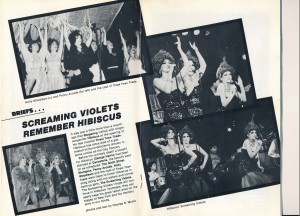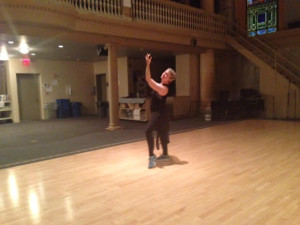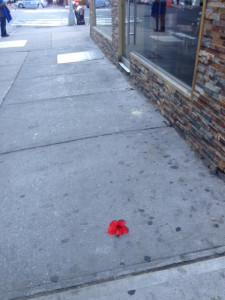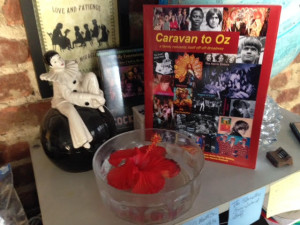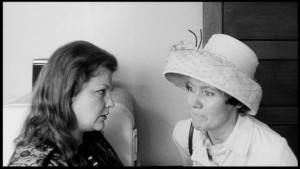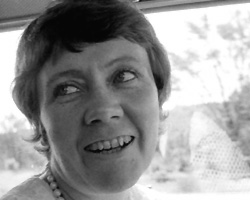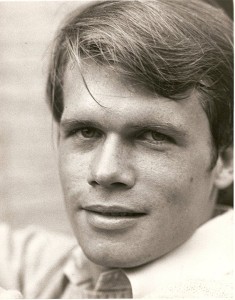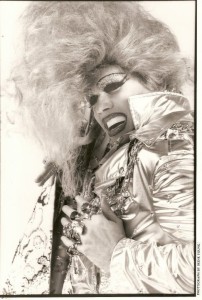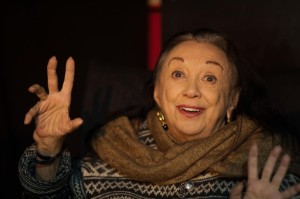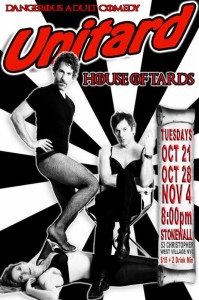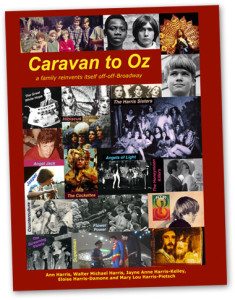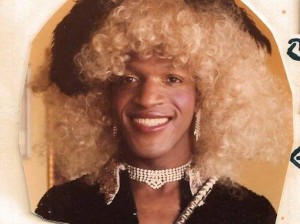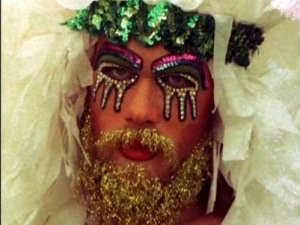
Real Beards, Real Ladies
New play about psychedelic drag legends The Cockettes gets a blessing from a living legend shimself
By Blake Driver

PHOTO COURTESY OF THE DOLLS
Angels of Light transports you to an epic hippie hellscape.
“OMG!!!” began a Facebook post by Kenneth Ansloan, Head Doll of The Dolls Theatre Troupe. “The one and only Rumi Missabu … an original member of the infamous hippie drag troupe The Cockettes, is going to be at our opening weekend!”
On New Year’s Eve in 1969, Missabu was one of 11 friends inveigled to dress up in vintage finery and perform a chorus line onstage at the Pagoda Palace Theater in exchange for free tickets to Nocturnal Dream Shows’ midnight screening. The newly branded Cockettes—a nod to The Rockettes—drove the audience wild with their bizarre antics and acid-fueled aesthetic. Thereafter, they became a monthly Palace fixture.
Until success burst the bubble.

JACK WEBER
The real Hibiscus, free-theater aficionado and head of The Cockettes
After Ansloan saw the 2002 documentary filmThe Cockettes, he conceptualized his new two-act playAngels of Light: The Practically True Story of The Cockettes. Moving between present-day and flashback segments, Ansloan plays an invented romantic interest named Juju to dramatize the event that simultaneously made and broke The Cockettes for all posterity: their big divorce.
“This troupe, this commune, these hippies, this family that was together for three years suddenly was torn apart,” Ansloan says. “And that fascinated me, and I made that kind of into a love story.”
In 1971, however, the deathblow was more philosophical than personal.
“The beginning was all about [Cockettes figurehead] Hibiscus and his ‘let’s put on a show’ attitude,” says Missabu, who spoke with the Alibi from his home in Oakland, Calif. And what a show it was, with bawdy showstoppers like “Gone With the Showboat to Oklahoma” and “a fairytale extravaganza on LSD, where all the fairytale characters come together.”
“They were the first bearded drag queens,” says filmmaking legend John Waters, who also got his start at the Palace, in the 2002 documentary. “Hippie, acid-freak drag queens, which was really new at the time.”

PHOTO COURTESY OF THE DOLLS
Like The Cockettes, The Dolls don’t do “buttoned-down.”
“So more and more people would jump up from the audience, who were just as dressed up and just as stoned as we were, and be in the show forever more,” Missabu explains, estimating that by the end, upwards of 160 people were associated with Cockettes’ performances in some capacity. By 1970, “there were 65 people on stage and that’s when I said, I’ve had it.”
The communal spirit, initially responsible for bringing The Cockettes together, sowed the seeds of disintegration as the troupe began to draw increasing exposure—and money—for their revolutionary form of street theater.
“Hibiscus was very much the hippie and was all about free theater,” Ansloan explains.

DAVID WISE
Rumi Missabu and Tina Turner (!) backstage at Basin Street West in San Francisco, 1971
“All these serious queens took over, and there was a board of directors. And it was like, board of directors? This isn’t fun anymore,” Missabu says with a laugh. “We had board meetings at The Cockettes’ château, and it was basically a bitch session of who was worth what for each show, based on who did what.”
Hibiscus’ battle to steer his troupe away from the trodden path of scripted productions was compounded when theater critic Rex Reed interested producers in taking their trippy form of guerilla drag east to the theater capital of the world. The question became, Will success spoil mediocrity?
“I read [that] it was the biggest hyped event in New York City since Elvis at Shea Stadium,” Missabu says. “People were clamoring and fighting for tickets.”
Before more than 40 Cockettes flew the coop for the Big Apple, Hibiscus left the group to form Angels of Light in the original free spirit of The Cockettes. Missabu, seeing the writing on the wall, joined him.

DAVID WISE
Rumi Missabu and Hibiscus in San Francisco’s famous Ross Alley, 1970
On Nov. 7, 1971, at New York’s Anderson Theater, a veritable red carpet turned out for The Cockettes’ opening night. Luminaries included Gore Vidal, Allen Ginsberg, John and Yoko, Andy Warhol and Angela Lansbury.
“Poor Truman Capote was too sick to come to New York,” Missabu reports. “He was in the hospital, so he just sent a telegram.”
When Truman Capote apologizes for missing “the glory and splendor of your New York debut,” you’re entitled to high hopes. But there’s also a Broadway-town maxim that would ultimately send The Cockettes packing with their tails between their legs: In New York, you have to deliver.
“The radical press back then really politicized us because we were so new,” Missabu says of the San Francisco media. “I like to say The Cockettes couldn’t live in the world of established performance or theater because ultimately we were like sexual outlaws. It was just a free-for-all. … Sex on the stage. Sex in the balcony with the audience.”

DAVID WISE
Rumi Missabu in Elevator Girls in Bondage, 1972
The New York press frequently reported that The Cockettes were everywhere but rehearsal. So when their opening number launched them with the same kind of chaotic disaster so celebrated back home, it became clear that what was lacking was some serious cultural context.
“People couldn’t get out of the theater fast enough,” Missabu says.
“Hibiscus was right,” says Ansloan. “What was popular and fascinating in San Francisco, the kind of LSD-influenced shows, didn’t work in New York because they expected to see a traditional play that was highly scripted and highly professional. … So Angela Lansbury of all people stood up and literally said … ‘Fuck this shit, I’m leaving.’”
The Cockettes finished their tour and returned home to stage some of their best work over the next year, including Journey to the Center of Uranus, in which Waters’ legendary film star, Divine, played a crab on the far-flung planet.
The Dolls’ Angels of Light, which includes video parodies of some of The Cockettes’ most notorious films (like their spoof on first daughter Tricia Nixon’s 1971 wedding), also features some highly anticipated Angela Lansbury drag. Missabu will host a Q&A afterward as well as a short, Cockettes-inspired performance after each of the opening weekend shows. He says this will be his first time seeing himself portrayed as a scripted character.
“That’s why this project seemed like a good fit,” Missabu says. “For me to have a good time and bring my magic to New Mexico, of all places.”
Angels of Light: The Practically True Story of The Cockettes
Runs May 15 through May 31
Fridays and Saturdays at 8pm, Sundays at 2pm
Aux Dog Theatre
3011-15 Monte Vista NE
254-7716, auxdog.com
Tickets: $20
Post-show Q&A and performances by Rumi Missabu held opening weekend, May 15 through 17.
